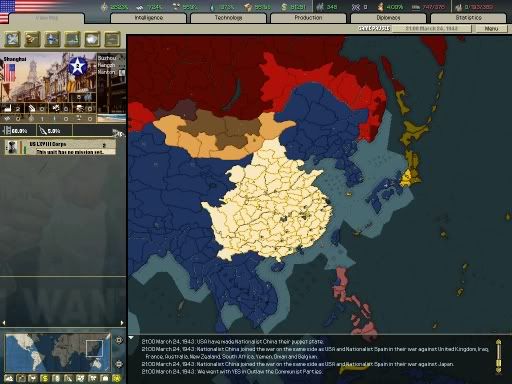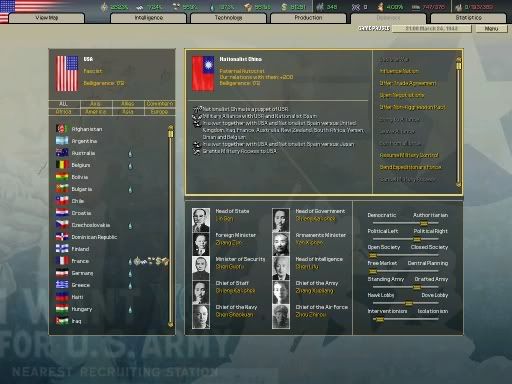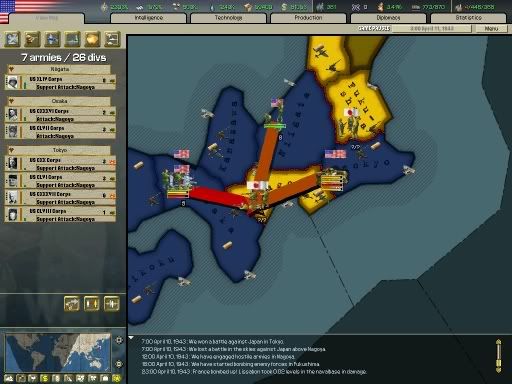In April 1943, a conference had been established in Nanking. After months of debate and agitation, the US government had finally agreed to open negotiations to discuss possible independence of various peoples in Asia. Among the most prime candidates were China and India. India, it was agreed, would not be independent during the war because it had never had an independent government since the British took over and stability was paramount through the war, but would be given the opportunity to form a National Comittee to decide the structure of India's future Government.
China, however, was a different matter. Because of the ongoing conflict in Asia, the US had continued to hold a number of Nationalist Chinese officers in detention to avoid the possibilty of them forming partisan organizations. Even still, the Americans didn't have the resources needed to garrison the Celestial Emmpire, and could certainly use an ally against Japan and eventually the USSR as the conflicting American and Soviet idealogies as well as their equally massive armies couldn't help but lead to armed confrontation. What kept it temporarily at bay was the American preocupation with the war against Japan and the fact that the Soviets were losing badly to the Germans in European Russia, having long since evacuated Moscow, Lenningrad, and Stalingrad, now battling at the foot of the Ural Mountains.
Present at the conference, aside from American First Citizen Gerald K. Smith and Secretary of State Ezra Pound were several Indian and Pakistani nationalist leaders and Chiang Kai-Shek. Lin Sen, the Chairman of the National Government, had suffered a stroke a month before while in captivity and was hospitalized. Chiang Kai-Shek had been seen by most in recent years as nothing more than a figurehead. Every time he spoke publicly, it was to support and praise the Americans. This time was different. Kai-Shek
had been brought low by his defeat and subsequent public enslavement. He still wore the uniform of his rank of a Generalissimo, but his age was rapidly advancing and his posture had sunk low from stress.
"Peoples of Asia and America," he began, in flawless English, "Publicly, since 1939 I have been an advocate of American supremacy," he paused, looked about the room at the various faces, "But it is a lie, a farce. I lost to the Americans, and I appreciate that they let me live when even when the Japanese insisted that I be publicly put to death, but the life of a puppet is not one worth living, and it is for this reason only that I risk saying this.
"China is known as the Celestial Empire, and for Millenia it has been a powerful force, surviving Barbarians, Foreign Invasions, and civil wars, yet now a flag which is alien to the Chinese people flies over the nation. There are worse things than American occupation, but this is no reason to deny the people of China the freedom they deserve. In 1938 we first fought the enemy that you now battle, Mr. Smith, and when Japan attack the Three Cities, our people, civilians, fought to help American troops retake our own land."
"If this is not evidence enough that an independent China would be the greatest ally America could ever have, then nothing ever will, but know that China will be independent sooner or later, be it a year from now or a century, and a free China can either be an ally to the United States or a potent enemy." The entire assembly was awestruck. Chiang Kai-Shek had never spoken to the Americans this way, not since his defeat in November of 1939.
"Generalissimo," Smith responded cooly, "Although your speech was moving, the fact remains that you, as the leader of Nationalist China, opposed American Peacekeepers sent to China. The American people cannot trust you or the Chinese people as a wartime ally. Perhaps things will change after the war, but until there is peace across the globe, there will be no Chinese nation."
Smith's declaration was enforced, and Kai-Shek was returned to his state of virtual captivity although it did cause more unrest in China than ever before. The change came about by the hand of Douglas MacArthur, however, who, after spending so much time and effort battling the Japanese and British, hadn't had a chance to deal in American politics, and although his deal with Smith still held, Smith's power had grown as more and more decisions and actions were taken without MacArthur's agreement.
There was no doubt that MacArthur ultimately wanted to lead the American people, and the recent turn of events had distanced him from political power. He realized that this was his opportunity to undermine Smith and prove that he was still the senior partner of their agreement.
MacArthur Met with the Generalissimo and publicly proclaimed that Nationalist China would be re-established, that prisoners would be released into Chinese custody, and that most American occupation forces would redeploy to other areas of Asia.
This extremely sudden and abrupt installation took Chiang Kai-Shek by suprise, and it made him understand that his former nemesis was the real power behind the scenes of American politics. MacArthur's partnership with Kai-Shek differed from his agreement with Smith because MacArthur and Kai-Shek respected each other, each having experienced first-hand the other's mettle in battle, each had dealt the other a crushing defeat at one point or other. Smith and MacArthur secretly despised each other for obvious reasons.
As American forces continued to advance in Japan, eventually capturing all of the mainland in late May, the Chinese Kuomintang began building a new army. Consisting of 9 irregular divisons, the 1KMT Corps was deployed to Manchuria to assist occupation efforts.
Smith was furious with MacArthur's contradiction of his decree, and secretly began to build a group of assassins in Washington in anticipation of MacArthur's eventual return to the USA.
Whew! Updated two seperate AARs in less than 24 hours.






